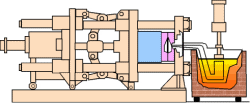Zinc Die Castings. A process in which alloys are forced to melt using high pressure and molded into steel, which is reusable is called die casting. These dies are molded to create shapes with great degree of repeatability and accuracy. It is best for different variety of serviceable and attractive finishes. Its parts are defined sharply, with surfaces that are textured or smooth.
Among the list of alloy to cast, zinc is the easiest. It has high impact strength, and high ductility that can be easily plated. The Zinc die casting is cheaper for small parts. It promotes long die casting tooling life and also has low melting point.
The first die casting started in mid 1800s using the alloys tin and lead. The process is done by injecting a pressure. The patent for machine used in printing type cast, which is operated manually was awarded to Sturges in 1849. In 1914, the use of tin and lead in die casting has reduced with the birth of aluminium and zinc alloys. Since then zinc die casting has become the famous die casting in the world. Hot Chamber zinc die casting as compared to aluminium die casting requires greater heat since aluminium has a great strength at high temperatures. Unlike zinc, aluminium is a lightweight alloy, with high dimensional stability for complex shapes and thin walls. Zinc is the easiest to cast so it became the most sought-after alloy in the industry of engineering.
Die casting process is economical and efficient as compared to other manufacturing processes that offer a broad range of components and shapes. It is designed to compliment different parts and have longer service life parts. The designers using die cast can gain number of benefits and advantages.


